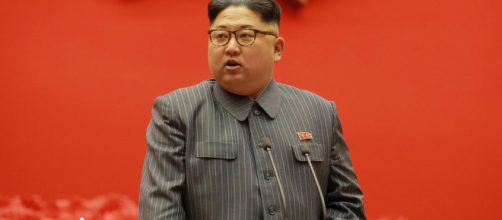When the distinct green train arrived from North Korea in Bejing on Sunday, media sources immediately assumed that the North Korean leader had arrived for a surprise visit. In the 1980s, a similar train had carried Kim Jong-un's father to China for talks. Sources immediately speculated that either Kim Jong-un or his sisters had arrived on the train.
The meeting was only officially confirmed late on Tuesday.
This was Kim Jong Un's first official state visit since taking power in 2011. According to the Guardian, China's support of sanctions against North Korea, as well as upcoming meetings with South Korea and the US, are believed to have been the driving force behind this surprise visit.
The green mystery train arrives and security in Bejing is stepped up
On Sunday, the famous green armoured train arrived in Bejing, sparking intense speculation.
Breaking: North Korean armored train spotted at Beijing, China. Kim Jong Un probably on board. pic.twitter.com/p0Lij0Q1Wo
— Augustus Manchurius (@1984to1776) March 26, 2018
Chinese local media broadcast footage of the train travelling through Dandong, located on the North Korean-Chinese border. Hotels in the area are believed to have barred reservations since Sunday to accommodate the guests on board the train. In the 1980's Kim Jong-II, Kim Jong-un's father, who had refused to travel by air, had used a similar train to travel to China.
Security in Bejing was also tight as security forces cleared popular tourist spots like Tiananmen Square and the main thoroughfare through Bejing, Changan Avenue.
Why did Kim Jong-un visit China?
Traditionally, China and North Korea shared close ties, as eighty to ninety percent of North Korea's food imports stem from China. However, according to CNBC, relationships have been in decline since Kim Jong-un took power in 2011. China has supported international sanctions against North Korea over its nuclear ambitions, with China's President Xi Jinping describing North Korea's nuclear provocations as a threat to Chinese national security.
China finds itself in a potential trade war with the US over Donald Trump's introduction of tariffs. At the same time, Kim Jong-un's upcoming meeting with the American president and South Korea may also have led the Chinese government to try to improve relations with North Korea before these high-powered meetings take place.
China's censors step in
According to the Washington Post, the Chinese censors swiftly reacted to speculations about Kim Jong-un's visit. On Tuesday, it was no longer possible to conduct an online search for "North Korea". Renowned for stringent censorship, authorities habitually block online search terms. At times, some of the blocked terms may not even be relevant or significantly related.
Among the phrases blocked on Tuesday was "Jin San Pang" which translates from Chinese as "Kim the third fatty". China's censors also blocked a post relating to Kim Jong-un's visit on the Chinese social media platform Weibo.
Several spokespersons from the Chinese foreign ministry said that they had "no information" as to whether Kim Jong-un or any other high-profile representative from North Korea had arrived for talks in China.
Media sources finally confirm Kim Jong's visit
According to the Guardian, observers believe that this visit represents a turning point in North Korea - China relations. China is believed to be eager to strengthen its position prior to North Korea's summer summit with the US and the meeting with South Korean's President, Moon Jae-in, in April of this year.
The Chinese Xinhua news agency finally confirmed that Kim Jong-un had held "successful talks" with the Chinese President, Xi Jinping late on Tuesday.
Xinhua also reported that North Korean leader had stated that "the issue of denuclearisation of the North Korean Peninsula can be resolved if South Korea and the United States respond to our efforts with good will."
According to observers, the North Korean leader's conditions include that the US removes its nuclear guarantee for South Korea.
The North Korean news agency KCNA hailed the visit as a "milestone".


